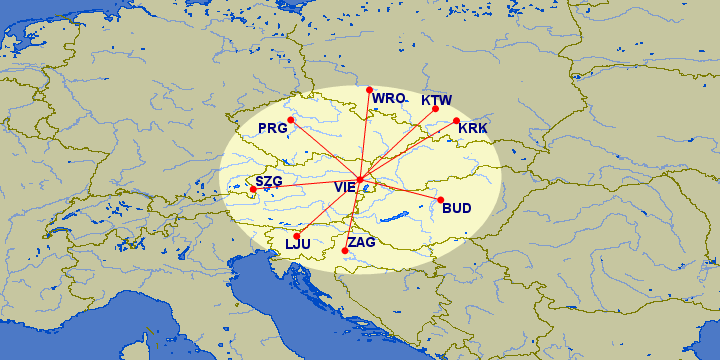Il Governo dell'Austria scende in campo a sostegno della disastrata compagnia aerea nazionale con un pacchetto che rivoluziona anche le tasse che si applicano ai passeggeri in partenza.
Finora erano previsti €3.50 per i voli a corto raggio e €17.50 per il lungo raggio; verranno uniformati € 12.00
Non è tutto: per i voli fino a 350 km, la tassa non sarà € 12.00 ma € 30.00 !

Le rotte colpite sono tutte in centro Europa e coprono un po' di capitali (Praga, Budapest, Lublana e Zagabria) e il sud della Polonia (Wroclaw, Katowice e Cracovia).
Tra le rotte nazionali, Salisburgo è dentro ma Innsbruck è fuori.
Singolare il caso di Monaco di Baviera: fuori per soli 6 km. In Italia, Venezia è fuori di un po'.
A me sembra un attacco a WizzAir che ha basi importanti in molti aeroporti di quelli citati.
Austrian dovrà rivedere la sua rete feed e rinunciare a un po' di destinazioni, a meno che la tassa non sia dovuta per i passeggeri in transito, ma per ora non risulta.
Queste mosse non aiuteranno certo il turismo in Austria a riprendersi, è bene che i governanti di altri paesi ci pensino bene prima di fare scelte simili.
Maggiori dettagli qui (fonte: Aerotime.aero):
Finora erano previsti €3.50 per i voli a corto raggio e €17.50 per il lungo raggio; verranno uniformati € 12.00
Non è tutto: per i voli fino a 350 km, la tassa non sarà € 12.00 ma € 30.00 !

Le rotte colpite sono tutte in centro Europa e coprono un po' di capitali (Praga, Budapest, Lublana e Zagabria) e il sud della Polonia (Wroclaw, Katowice e Cracovia).
Tra le rotte nazionali, Salisburgo è dentro ma Innsbruck è fuori.
Singolare il caso di Monaco di Baviera: fuori per soli 6 km. In Italia, Venezia è fuori di un po'.
A me sembra un attacco a WizzAir che ha basi importanti in molti aeroporti di quelli citati.
Austrian dovrà rivedere la sua rete feed e rinunciare a un po' di destinazioni, a meno che la tassa non sia dovuta per i passeggeri in transito, ma per ora non risulta.
Queste mosse non aiuteranno certo il turismo in Austria a riprendersi, è bene che i governanti di altri paesi ci pensino bene prima di fare scelte simili.
Maggiori dettagli qui (fonte: Aerotime.aero):
Austrian government puts foot down on low-cost tickets
The Austrian government will introduce a set of taxes on flight tickets, as it aims to combat aviation’s emissions footprint in the country. The taxes were first introduced in January 2020, under a coalition agreement by the Austrian People’s Party (ÖVP) and the Green Party following a snap election in the country. Now, the new regulations are being introduced together with the rescue package to Austrian Airlines,
Previously, taxes on flights ranged from $3.9 (€3.50) to $19.7 (€17.50) on short-haul and long-haul journeys, respectively. Instead, Austria will now tax flights at $13.50 (€12), no matter their distance.
Furthermore, short-haul flights that are under 350 kilometers (217 miles) will be taxed at $33.7 (€30) per flight.
The new set of regulations also includes an anti-dumping policy on ticket prices. Companies would be unable to increase demand by filling the market with cheap tickets, as they would have to cost at least as much as the taxes and charges for the flight. While there is no minimum set price as of now, the Minister of Transport of Austria Leonore Gewessler predicted that a round-trip to Austria would cost at least $45 (€40) per person. The anti-dumping rules were put in place to stop “certain excesses and their social and ecological consequences,” stated the Austrian government.
In July 2019, Carsten Spohr, the chairman of Lufthansa, the parent company of Austrian Airlines, stated that the ticket prices of Europe’s low-cost carriers are “economically, ecologically and politically irresponsible.”
All in all, both Austrian Airlines and Lufthansa have had their fair share of struggles with low-cost carriers. Austrian Airlines’ chief executive Alexis von Hoensbroech directly addressed Ryanair’s Michael O’Leary in November 2019, stating that he was “wrong if he thinks that he can overtake us here in Vienna.”
“We will not retreat a single millimeter and will maintain our premium strategy,” back then added the Chief Commercial Officer Andreas Otto.
Environmental pillar in the state-aid deal
The new set of regulations and taxes are a part of a rescue package for Austrian Airlines. Environmental issues play a major part in the deal. Including the new pricing policies, the Vienna-based carrier promised to increase its fuel efficiency by 1.5% and reduce its CO₂ emissions by half by 2030 or on average, spit out 8.5 kilograms of CO₂ per 100 passenger kilometers, rather than the current level of 9.5 kilograms. In addition, Austrian Airlines will transfer short-haul flights to rail, where the train infrastructure allows travelers to reach Vienna Airport (VIE) in “considerably less” than three hours of travel time.


